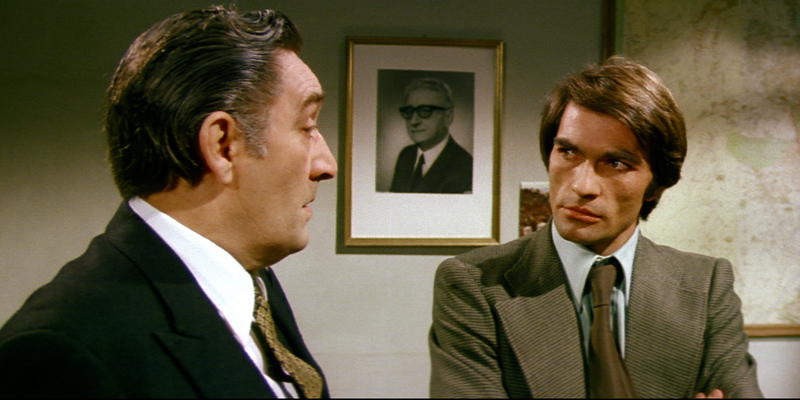
Review by
Eric Hillis
Directed by: Sergio Martino
Starring: Luc Merenda, Tomas Milian, Mel Ferrer, Delia
Boccardo, Paola Tedesco

If the swinging sixties was Europe's belated party to celebrate
patching things up after WWII, the 1970s was one big hangover. Thanks to
extremists on both sides of the political fence, the cities of Western
Europe were regularly rocked by explosions in town squares, in railway
stations and on public transport, and hijackings and kidnappings were
commonplace. After taking its place as the glamour capital of the
continent in the '50s and '60s, Italy found itself drenched in blood as
fascists and communists battled for control, while the Mafia took
advantage of the distracted police to amp up their activities. This
period, known as "The Years of Lead" was reflected in a new Italian
cinema of violence, with gialli, cop thrillers, gangster movies and
political thrillers all enjoying success as they exploited the unease
felt by Italian cinemagoers.

Though best known for his gialli work, Sergio Martino dabbled in
all of the aforementioned sub-genres, and his 1975 conspiracy thriller
Silent Action often feels like a mashing together of the
various strands of Italian popular cinema of its era. It's got car
chases, shootouts, beautiful young women stalked and preyed upon by
killers, and a heavy dose of mistrust of Italy's powers that be. It
might be viewed as a lesser companion to Massimo Dallamano's 1974
What Have They Done To Your Daughters?, which so expertly blends its sub-genres that it's arguably the ideal
entry point for anyone wishing to explore Italian pop cinema.
Silent Action lacks the rapid pacing and adrenalised
energy of Dallamano's film, as seen in its languid first half, which
plays a lot like a TV police procedural. Following a montage of high
ranking military officials being assassinated in ways that look like
suicide (watch out for that prosthetic head being severed by a train!),
we're introduced to our chiseled hero, police inspector Solmi (Luc Merenda).

Solmi is called in to investigate the murder of an electrical
engineer, who suspiciously lives in a home well above his job title's
pay grade. A long strand of black hair found at the crime scene leads
Solmi to believe the victim had been visited by a woman (an odd
assertion in the glam rock era), and upon investigation he learns that
the murdered man was sidelining as a private investigator. With the aid
of his journalist girlfriend (Delia Boccardo), Solmi digs deep
and uncovers a sinister plot involving a right wing paramilitary group
intent on seizing power.
If Silent Action's first half feels like a bit of a drag, as Solmi moves from one
interrogation to another, stick with it, as Martino's film suddenly
explodes into life in its back half. When a witness is killed en route
to jail, we get a cracking car chase involving an assassin on a
motorbike being chased by Solmi in his battered police issue jalopy
while a bunch of hoods try to run him off the road. It's a classic '70s
Italian car chase, with knackered cars bashing lumps out of each other
and stuntmen running the sort of risks they'd never be allowed to today
– you can almost smell the sweating insurance agents looking on behind
the camera. This is quickly followed by a giallo-esque scene in which a
prostitute (Paola Tedesco) is hunted by killers who wish to
silence her, and the film climaxes in a mass shootout that wouldn't be
out of place closing out a Roger Moore Bond movie.

I've always preferred when these movies give us an out-of-depth Joe
Public protagonist rather than a competent public servant. Despite the
dangerous bee's nest he's poking, Solmi never really feels like he's in
much peril. Conversely, the aforementioned scene involving the
prostitute is the film's most tense sequence, as we genuinely fear for
her. A more interesting version of this film might have played out from
her perspective, perhaps teaming up with Solmi ala Jane Fonda and Donald
Sutherland in Klute. Yet while Silent Action is never quite as gripping as
it might have been, it's an entertaining distillation of everything that
was occurring in both Italy's cinema and its politics in the '70s, a
fruitful time on screen if a fearful era on the streets.

Italian and English audio tracks; commentary by Mike Malloy; a talking
heads heavy documentary on "The Age of Lead"; interviews with Sergio
Martino, Luc Merenda and composer Luciano Michelini; archival
featurette. The disc also comes in a limited edition slipcase with a
soundtrack CD and collector's booklet.

